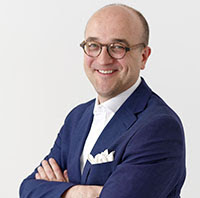| |
 |
The Prodigal Son,
Sculpted by Herman Wald (1906-1970),
Executed in 1963,
Patinated bronze,
© Herman Wald Artist |
The tax collectors and the sinners were all seeking the company of Jesus to hear what he had to say, and the Pharisees and the scribes complained. ‘This man’ they said ‘welcomes sinners and eats with them.’ So he spoke this parable to them:
‘A man had two sons. The younger said to his father, “Father, let me have the share of the estate that would come to me.” So the father divided the property between them. A few days later, the younger son got together everything he had and left for a distant country where he squandered his money on a life of debauchery.
‘When he had spent it all, that country experienced a severe famine, and now he began to feel the pinch, so he hired himself out to one of the local inhabitants who put him on his farm to feed the pigs. And he would willingly have filled his belly with the husks the pigs were eating but no one offered him anything. Then he came to his senses and said, “How many of my father’s paid servants have more food than they want, and here am I dying of hunger! I will leave this place and go to my father and say: Father, I have sinned against heaven and against you; I no longer deserve to be called your son; treat me as one of your paid servants.” So he left the place and went back to his father.
‘While he was still a long way off, his father saw him and was moved with pity. He ran to the boy, clasped him in his arms and kissed him tenderly. Then his son said, “Father, I have sinned against heaven and against you. I no longer deserve to be called your son.” But the father said to his servants, “Quick! Bring out the best robe and put it on him; put a ring on his finger and sandals on his feet. Bring the calf we have been fattening, and kill it; we are going to have a feast, a celebration, because this son of mine was dead and has come back to life; he was lost and is found.” And they began to celebrate.
‘Now the elder son was out in the fields, and on his way back, as he drew near the house, he could hear music and dancing. Calling one of the servants he asked what it was all about. “Your brother has come” replied the servant “and your father has killed the calf we had fattened because he has got him back safe and sound.” He was angry then and refused to go in, and his father came out to plead with him; but he answered his father, “Look, all these years I have slaved for you and never once disobeyed your orders, yet you never offered me so much as a kid for me to celebrate with my friends. But, for this son of yours, when he comes back after swallowing up your property – he and his women – you kill the calf we had been fattening.”
‘The father said, “My son, you are with me always and all I have is yours. But it was only right we should celebrate and rejoice, because your brother here was dead and has come to life; he was lost and is found.”’ |
|
|
| | Reflection on the Sculpture
Our sculptor artist of today, Herman Wald, was born on 7th July 1906 in Romania, as part of a Jewish family. As you may have noticed, the Prodigal Son is outstretched, naked, vulnerable and in a pose of complete humility in front of the standing figure. The upright figure should be the father, but in our sculpture, the prodigal son does not return to his father, but to his mother. The reason behind this is that the sculptor left Europe, which was becoming anti-Jewish, in 1937 for South Africa. He left his own mother behind and, sadly, she perished in the Holocaust. This sculpture is about Herman Wald portraying himself as the prodigal son returning to his mother, expressing his survivor’s guilt for leaving his mother behind. The prodigal son, bent in an upward arch, shows how everything from his past, through his feet, his naked scarred body, all lead back to his mother. The soles of his feet are turned towards us, the viewer, inviting us into his pain. The mother figure bends over him, with arms hanging helplessly by her side. She wants to support him, but she is no longer there…
The artist, like the prodigal son, humbled himself through this work, admitting he had made a mistake in retrospect. In today's parable, the son returns to his father thinking he would have to plead with his father for forgiveness and that perhaps he could be taken back as one of the servants. But, as we read, his father not only forgives him, but welcomes him back with open arms and celebrates his return with a feast. It is never too late to return to our families, big or small. There will come a moment of clarity, a moment to say: ‘I want a relationship once again with those who love me… my family, however broken it is… I need to go home!’…
by Patrick van der Vorst
|  | |
|
|
|
No comments:
Post a Comment